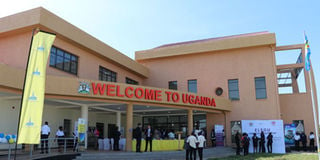Elegu one-stop border post expected to boost trade

The newly commissioned Elegu one stop border point after being declared fit for occupation recently by the contractor, Seyani Brothers. This border point is expected to facilitate trade between Uganda, South Sudan and the East African region. Photo by Ismail Musa Ladu
What you need to know:
The $6.6 million Elegu border post funded by Trade Mark East Africa and the Department for International Development is ready to facilitate trade between Uganda and South Sudan, Ismail Musa Ladu writes.
After three years of construction, including a temporary halt of the project once, Elegu One Stop Border Post (OSBP) has finally been handed over to Uganda Revenue Authority (URA) after it was declared technically fit for occupation.
The handover officiated by the Minister of Trade Ms Amelia Kyambadde recently means the $6.6 million infrastructure funded by Trade Mark East Africa (TMEA), with support from among others Department for International Development (DFID) is now ready to facilitate trade between both neighbouring countries—Uganda, South Sudan, and the East African region.
According to the URA Commissioner Customs, Mr Collins Dicksons Kateshumbwa, Elegu border is a major entry and exit point between Uganda and South Sudan with the largest volumes of goods and people crossing every day.
But before the completion of the Elegu border post, customs operations at the Uganda-South Sudan border were wanting.
“Over the years, border agencies have endured tremendous pressure to serve under unfavourable conditions for travelers, traders and officials to meet the needs of the New Nation. The challenges were enormous. With the completion of this infrastructure, users of this border will be relieved,” Mr Kateshumbwa said while handing over Elegu OSBP.
Like other OSBPs, Elegu OSBP will bring Customs and other government agencies from Uganda and South Sudan together, working from the same office to quicken export and imports while reducing business costs.
Trade volumes
Mr Kateshumbwa who was representing his Commissioner General, Ms Doris Akol, further noted that that over the last five years, trade volumes in terms of exports through Elegu border grew from Shs197.8 billion to Shs225.2 billion.
Over the same years, imports through Elegu border rose from Shs0.5 billlion to Shs1.2 billion. For transits, it increased from Shs92 billion to Shs200 billion. He also disclosed that as soon as next year, non-intrusive inspection scanners will be installed at the Elegu border to curtail concealment of cargo.
According to the senior director country programmes at TMEA, Mr Moses Sabiiti, Elegu border point being one of the busiest borders in East Africa. With most of the traffic being commercial, establishing a one-stop border post along the Northern Corridor will reduce the time and costs involved in crossing the border.
Quoting Baseline Time and Traffic studies undertaken in June 2013, Mr Sabiiti said it takes 59 hours and 50 minutes to cross from Elegu to Nimule and four hours and 16 minutes to cross between just Nimule and Elegu.
“The Elegu-Nimule (Uganda – South Sudan) One Stop Border Post (OSBP) aims at reducing by 30 per cent the time it takes to cross the border; thereby; easing trade and the movement of people,” Mr Sabiiti says.
According to URA records and studies conducted by TMEA, on a daily basis, on average, 381 vehicles cross from Elegu to Nimule and 308 vehicles make the return journey.
User satisfaction of the infrastructure and services rendered at Elegu reportedly stood at 30 per cent and TMEA hopes to attain 70 per cent upon the completion of the project.
Funding and outputs
TMEA, with funding from Department for International Development (DFID), financed the construction of the Elegu OSBP while the Governments of Canada and Uganda financed the integrated border management system (IBM) and the land acquisition and VAT payments for the project, respectively.
Elegu OSBP is made up of Improved physical infrastructure such as; an administration building, warehouses and verification sheds, animal and fisheries building, truck parking yard, gate houses, scanner yard, canopies and a boundary wall. There is also Improved ICT infrastructure which interlinks the border agencies of Uganda and Kenya. Furthermore, the OSBP project will have synergies with other ongoing interventions in trade facilitation interventions such as the Uganda Electronic Single Window.
In her remarks, Ms Kyambadde said the facility if put to its proper use, will reduce the cost of doing business and boost the country’s ranking in the ‘Ease of Doing Business Report’ which has perpetually rendered the country an “unattractive” investment destination due to the high cost of doing business here.
She also said peace, security and stability is a prerequisite for economic development. She noted that for the OSBP to realise its full potential, all the three ingredients must be guarded jealously.
She said: “South Sudan has been our strategic market for our exports but due to instability, trade has declined. We need to go back to the level of trade we used to have. The security of our traders doing business in South Sudan is also important and it should be guaranteed.”
The Under Secretary Ministry of Trade in South Sudan, Mr Athian Kuol, pledged to stop harassment of Ugandan traders in South Sudan.
He also said South Sudan is committed to the peace deal recently signed.
Private sector view
The Private Sector Foundation Uganda, director policy and advocacy, Mr Moses Ogwal, in an interview, said Elegu OSBP will make complete sense to private sector players once the Nimule OSPB in South Sudan side is complete.
OSBP
An OSBP (One-Stop Border Post)is a border facility that combines two stops for national border control processing into one and consolidates border control functions in a shared space for exiting one country and entering another. It requires that all competent authorities work together in an effective and efficient manner.




